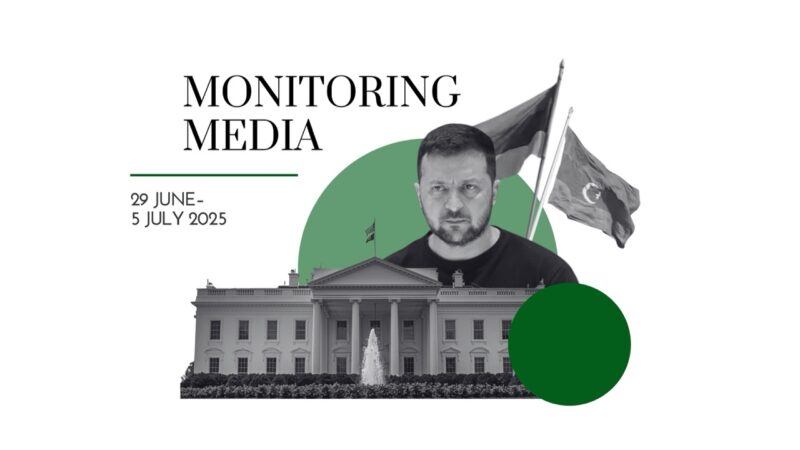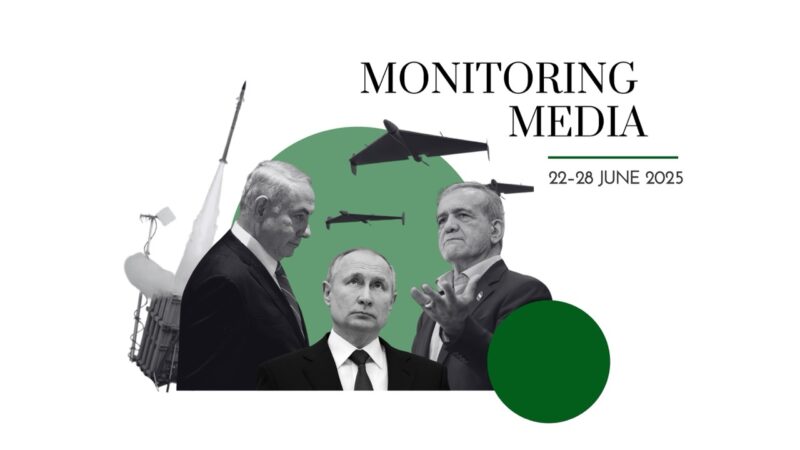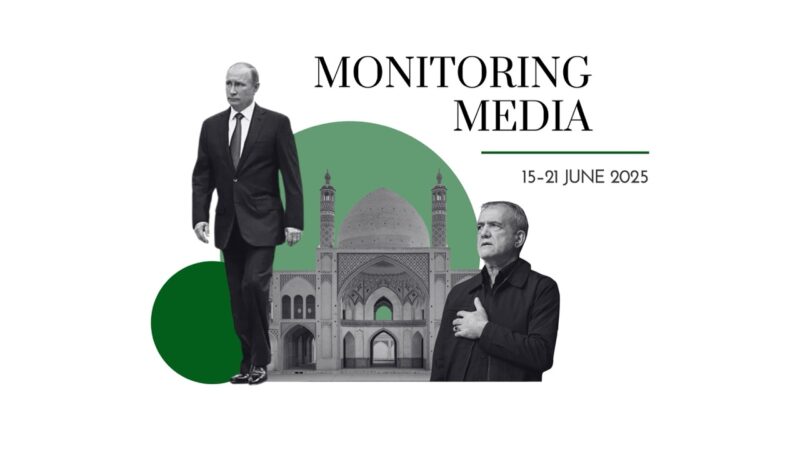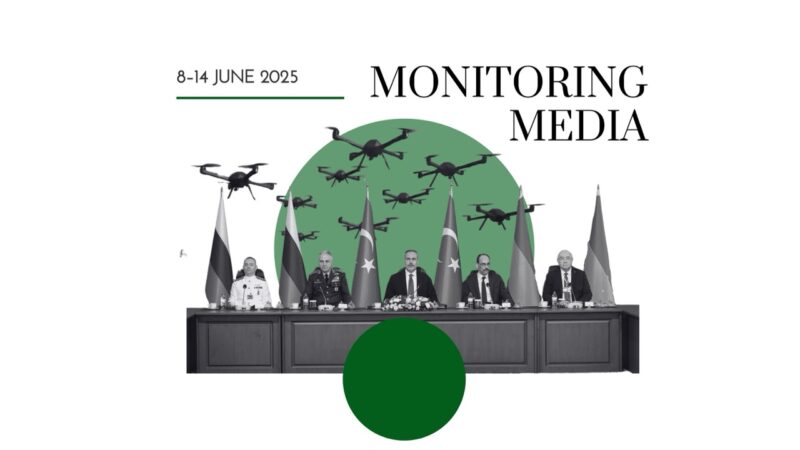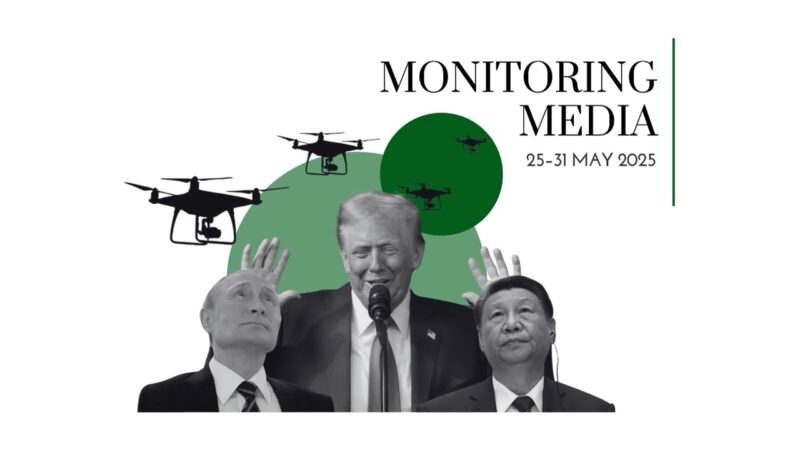Expecting more, Ukraine nevertheless gains a lot from the 2023 NATO Summit in Vilnius

CIUS weekly report on North American media coverage of Ukrainian affairs, 8–14 July 2023
Two publications (Atlantic Council and The National Interest) were selected to prepare this report on how the situation in Ukraine has been portrayed in the North American press during the past week (8–14 July 2023). The sample was compiled based on their impact on public opinion as well as on their professional reputation, popularity among the readership, and topical relevance. These two publications represent centrist and conservative viewpoints on the political spectrum.
This report covers only the most-read and relevant articles about Ukraine, as ranked by the respective North American publications themselves in the past week. Its scope covers promoted articles on home pages and articles from special sections on Ukraine, with the hashtag #Ukraine, from the paper editions of the publications, and about Ukraine from opinion columns and editorials.
Topics featured in the selected articles:
- Ukraine’s current affairs: Ukraine did not get an official invitation to NATO during the 2023 summit in Vilnius but hopes to get it next year during the summit in Washington; Ukraine’s membership in NATO will likely aggravate Russia more;
- The world and Ukraine: the West should increasingly engage Ukraine’s local administrators and officials in its plans for postwar reconstruction;
- Russia at war: Wagner’s mutiny may inspire the Russian army to start an uprising of its own.
Main arguments:
Ukraine is not entirely happy with the decisions of the recent NATO Summit. Peter Dickinson (Atlantic Council) suggests that “the 2023 NATO Summit in Vilnius failed to produce a breakthrough toward Ukrainian membership but did underline international support for Ukraine in the fight against Russia’s invasion.” On the one hand, NATO leaders confirmed new weapons deliveries, the creation of a coalition to train Ukrainian pilots to fly F-16 jet fighters, and establishment of the NATO-Ukraine Council. On the other hand, no clear timetable for Ukraine’s membership in the alliance was offered, due to the professed necessity of “additional democratic and security sector reforms.” The latter decision fell short of the expectations of the government in Kyiv and brought disappointment to President Zelensky and his team. Dickinson highlights that while several countries have publicly backed Ukraine’s bid to join NATO, “there is no unanimity on the issue among the 31-nation alliance.” In particular, the US remains hesitant and defines the possibility of Ukraine’s membership as “premature.” The most ardent supporters of Ukraine, in their turn, advocate that the promise of NATO membership is the only way to deal with the security challenges in Europe. With Ukraine remaining on the sidelines, however, Russia will only be motivated to prolong the fighting and escalate its atrocities. Dickinson also mentions that the NATO Summit in Vilnius frustrated many people in Ukraine, especially those directly engaged in the war effort. The high perceived value of the alliance risks becoming tarnished in the public view. That being said, Ukrainian officials seem to have weathered the news and plan to revitalize the discussion of their country’s membership during the 2024 NATO Summit in Washington.
In his other article on the same topic, Peter Dickinson (Atlantic Council) assumes that Ukraine’s expectations on the eve of the NATO Summit might have been too high and, thus, unrealistic. Regardless, Ukraine was offered quite a lot. And despite the absence of any solid membership timetable, Ukraine’s future in NATO without a membership action plan was greenlit. To look deeper into the topic, Dickinson interviews a few Ukrainian experts.
- Danylo Lubkivsky, a director at the Kyiv Security Forum, claims that “the alliance has clearly failed to seize the strategic initiative or achieve a political breakthrough” and that “NATO leaders still appear to be trapped in defensive thinking.” At the same time, Russia should by no means feel encouraged, because Western partners will continue to firmly support Ukraine’s war effort.
- Olena Halushka, board member at the Anti-Corruption Action Center, considers that while Ukrainian officials were aware of the impossibility of full membership in NATO before the war ends, they considered a non-binding invitation as an achievable objective. Today they are working on obtaining an invitation for Ukraine to join the alliance during the summit in Washington next year.
- Oleksiy Goncharenko, a Ukrainian MP from the European Solidarity Party, believes that “the language adopted in the summit communique was not strong enough. This was a big mistake, as the only language Vladimir Putin understands is strength.” Also, he finds it ironic that during the 2008 NATO Summit in Bucharest the US had insisted on inviting Ukraine, while fifteen years later it was the same US hampering Ukraine’s accession.
- Volodymyr Dubovyk, an associate professor at Odesa Mechnikov National University, argues that while the wording of the final communique was vague, all NATO members confirmed their readiness to continue military, political, and financial support for Ukraine.
- Iuliia Mendel, former press secretary to the Ukrainian President, states that instead of a decisive action which would secure Ukraine’s survival, she observed a lot of bureaucratic discussions and a “box-ticking exercise” in Vilnius. She points to two major reasons why the 2023 summit ended as it did: “Firstly, some Western leaders are still concerned that issuing Ukraine with an invitation to join NATO could lead to an escalation and expansion of the current war. Secondly, there are also legitimate reservations over Ukraine’s readiness for membership, particularly in terms of the country’s domestic reform agenda.”
Contrary to the Atlantic Council, whose authors argue for the necessity of Ukraine joining NATO in future, The National Interest published two articles that unequivocally oppose Ukraine’s transatlantic security aspirations.
Any prospect of Ukraine’s membership in NATO will aggravate Russia and drag the US into the war. Robert G. Rabil and Francois Alam (The National Interest) criticize an open letter signed by 46 foreign policy experts that recommends helping Ukraine to restore control over its internationally recognized 1991 borders and invites it into the transatlantic alliance. Rabil and Alam believe that “this letter is an open invitation to WWIII and the mutual destruction of the West and Eurasia. It is based on flawed analysis wrapped in hubris, indifference, and ignorance of history, geography, and geopolitics.” Their belief is built on several arguments. Firstly, both Soviet and Russian regimes have signaled to the West that NATO’s eastward “expansion” undermines their national security and would inevitably trigger a defensive response. While Russia could accept the accession of Central European states into the alliance, Ukraine’s transatlantic aspirations would be intolerable. Secondly, the authors assert that the territories of Crimea and the Donbas have been “integral to the formation of Russia and thereafter the Soviet Union since Moscow’s defeat of the Mongols in the fifteenth century,” as well as “figured prominently in Moscow’s drive to expand, protect, and project the power of the Tsarist Empire.” Therefore, no leader in the Kremlin, be it Putin or someone else, will ever willingly give these Russia-occupied territories of Ukraine back to Ukraine. Thirdly, in its war against Ukraine, Russia will be fighting till the end and ignore all its losses. This war is comparable to the ones against Napoleon, where “Russians preferred to set Moscow ablaze rather than concede defeat,” or against Nazi Germany, where “the Red army stood its ground at a staggering cost and dealt the Wehrmacht a severe blow.” In other words, the West and Ukraine simply cannot win this war. Rabil and Alam conclude that “gripped by a false sense of morality enveloped in hubris and Machiavellian calculations, the Biden administration is steadily taking Americans and many nationalities the world over to the precipice of nuclear abyss and global destruction over faraway lands demographically, politically, and historically conflicted.”
In turn, Christopher A. Preble and James Siebens (The National Interest) highlight that constant discussions of Ukraine’s NATO membership merely serve as distractions from more important matters that the alliance needs to address in the first place: “A futile discussion about Ukraine’s eligibility for NATO membership makes Ukraine less secure by delaying and distracting from a discussion of concrete medium- and long-term steps to end the conflict and, after the killing stops, ensure that Russia doesn’t restart the war.” Preble and Siebens argue that there is no unanimity—and likely will not be—on Ukraine’s accession among the current NATO member-states. This is directly related to the fear of new waves of Russian escalation and Ukraine’s failing to match the standards of membership, such as “a functioning democratic political system based on a market economy; fair treatment of minority populations; a commitment to resolve conflicts peacefully; an ability and willingness to make a military contribution to NATO operations; and a commitment to democratic civil-military relations and institutions.” At this moment, the authors argue, the issue of Ukraine’s NATO membership should be placed on hold, as it is most controversial and divides the alliance. Moreover, NATO should continue arming Ukraine but avoid applying the security guarantees under Article 5 to it. Preble and Siebens conclude that “it’s time for NATO leaders to stop misleading Ukraine’s government and the American public about Ukraine’s prospects for membership in the alliance, and to get serious about ending the conflict as a first step toward NATO’s goal of ‘increased stability and security for all in the Euro-Atlantic area.’ Whatever security guarantees are discussed as part of any eventual negotiation, they will not—and should not—come from NATO.”
International projects for Ukraine’s postwar reconstruction should involve local administrations. Zachary Popovich and Michael Druckman (Atlantic Council) argue that it is crucial for the international community that is preparing for Ukraine’s postwar reconstruction to maximize collaboration with local Ukrainian authorities and institutions. Popovich and Druckman begin their article with an observation that “local officials and mayors have courageously stepped up to the challenge of wartime governance, with citizens increasingly turning to them to address emergency humanitarian and security challenges. Ukrainian mayors often serve as primary lines of defense responsible for processing medical aid, engaging directly with international organizations, and repairing damaged infrastructure.” In this light, it will be very beneficial for Ukraine’s foreign partners to use the existing potential of self-governance and further empower local leaders to manage redevelopment projects and infrastructure repair. Popovich and Druckman highlight that the decentralization reforms launched in 2014 were quite successful. The transfer of some of the economic and political decision-making powers from national to local levels “introduced unprecedented positive changes in quality of life for millions of Ukrainians; the share of citizens living below subsistence levels fell from 52% to 23% between 2015 to 2019.” Speaking of foreign partners, they have already started pondering on a few reconstruction projects: public and private leaders from over 60 countries pledged significant investments during the Ukraine Recovery Conference in London, and the European Commission unveiled its Multi-Agency Donor Coordination Platform to streamline future Ukrainian international recovery assistance. In turn, the government in Kyiv presented a draft Recovery and Development Plan at the 2022 Ukraine Recovery Conference in Lugano, Switzerland.
The Russian army may follow the Wagner Group’s example and start a mutiny against Putin. Mercedes Sapuppo (Atlantic Council) raises the question: “With dozens of senior Russian officers reportedly detained following the Wagner revolt and a senior commander dismissed this week for criticizing the conduct of the Ukraine invasion, could Putin face a mutiny within the Russian army?” The answer is “very probably”: Russia’s increasingly disgruntled army and its battle-hardened officers may be encouraged by the Kremlin’s meek response to the Wagner mutiny and proceed with the cause that Yevgeny Prigozhin and his henchmen ignited, then abandoned. Continuous failures and casualties in Ukraine may trigger the desire among military personnel to vent their stress within Russia and against its ineffective command. Not to mention that the Kremlin’s most recent policy of cleansing the most critical officers, such as General Ivan Popov (who openly spoke about the mismanagement of the invasion), do not encourage loyalty in the ranks of the Russian army. On top of that, “Putin’s apparent readiness to compromise [with Prigozhin] has created the impression of a vulnerable dictator who lacks both the support and the military strength to follow through on his earlier vow to ‘crush’ the mutiny.” If successful, a new mutiny launched by the Russian army could be joined by thousands of former Wagner fighters along with members of Russia’s many other private military companies. Also, Sapuppo recommends studying the behaviour of Chechen leader Ramzan Kadyrov. As of today, he remains loyal to the Kremlin, not least because he enjoys a wide autonomy in his fiefdom and does not have a reason to challenge the existing leaders and hierarchies. Sapuppo concludes that “Putin has been careful to keep loyalists in top positions, but as the invasion of Ukraine continues to unravel, there are growing indications of disaffection among both commanders and troops. With Russian generals now reportedly being detained and dismissed, the scale of the threat should not be underestimated. In the months ahead, this may lead to fresh challenges to Putin’s rule that will dwarf the Wagner mutiny.”
Worth your attention:
Robert G. Rabil and Francois Alam (The National Interest) argue in their article that Ukraine should not seek NATO membership as this will aggravate Russia even more, throw the whole alliance into an unnecessary clash with Russia, as well as ignore the historical and geopolitical context that has emerged in Central and Eastern Europe. That being said, a few arguments that Rabil and Alam raise to support their position have weak points to them.
Rabil and Alam use the Russia-promoted term “expansion” with respect to NATO. By doing so, the analysts challenge the agency of NATO members and partners. According to his viewpoint, these are not sovereign states (e.g., Sweden, Finland, Ukraine, Georgia) deciding to develop their cooperation with the Alliance but rather the Alliance purposefully “expanding” to incorporate sovereign states into its structures against their will. The more accurate and therefore preferable term with respect to NATO is “enlargement,” which also reflects the Alliance’s own wording. For additional insight, we suggest an article by Daniel Ramallo (The National Interest).
Rabil and Alam argue that Russia’s invasion of Ukraine was not least provoked by the ambition of the latter to join NATO and, consequently, pose a detrimental threat to Russia’s security. However, analysts overlook the fact that the borders of NATO member-states with Russia have been some of the most secure in the world. For more than 70 years, since the inception of the alliance, there have been no conflicts—neither between the USSR and NATO nor between post-Soviet Russia and NATO. Rather, the western border of Russia has always been diligently guarded and protected, especially on the side of NATO member-states. For additional insight, we suggest an article by Leonid Gozman (Atlantic Council).
Rabil and Alam suggest that NATO and the US courted Ukraine, providing the casus belli for Russia. However, the alliance has never aimed to threaten Russia; quite the opposite, it actually developed a special institutional framework of cooperation for the federation, and in the early 1990s Russia even considered joining NATO. Therefore, apart from serving as a convenient target for the Kremlin’s propaganda, NATO’s “cooperation” with Ukraine can hardly be defined as a major threat justifying the invasion. For more details, we suggest an article by Hans Petter Midttun (Euromaidan Press).
Rabil and Alam do not provide the reasons that motivated the West to support Ukraine in the first place. One such reason is undoubtedly the vital necessity of responding to blatant violations of international law and the UN Charter. If these violations succeed and international law fails, all states—and above all, the countries of the West—will face much more global instability than there exists today.
Rabil and Alam argue that Ukraine cannot win the war against Russia, as the latter is ready to utilize all the resources it possesses to gain victory. Also, the Russian army has proven to be almost invincible in the world’s major conflicts, such as the Napoleonic wars or WWII. That being said, analysts overlook the major defeats of Russia and the Soviet Union in the Russo-Japanese War, Soviet-Polish War, and Soviet-Finnish War. In other words, Russia has a long record of losses in armed conflicts against countries with much less military potential.
Rabil and Alam argue that the intensification of cooperation between Ukraine and the West, in particular with NATO and the EU, undermines the centuries-old historical and geopolitical interdependencies that have been established in Central and Eastern Europe. That being said, the analysts approach these interdependencies uncritically—they implicitly accept the superiority of Russia in executing supervision over its neighbours and communicating the histories of these neighbours to the world. Rabil and Alam do not try to approach the Central and Eastern European space as one that is undergoing decolonization and is trying to refute Russia-originated legacies and traditions.
Many of the arguments by Rabil and Alam are also challenged in articles by Leif Wenar (The Wall Street Journal) and Nicolas Tenzer (The Conversation).
Christopher A. Preble and James Siebens (The National Interest) argue that Ukraine should not be offered full-fledged NATO membership in the nearest future. If accepted into the alliance, Ukraine will, they declare, further erode the global security architecture. Therefore, the decision of NATO members during the 2023 Summit in Vilnius was the correct one.
The analysis of Preble and Siebens seems to be based on a major misleading premise. They approach Ukraine as a state that is jockeying to join NATO as soon as possible, regardless of being institutionally unprepared or having a war being waged on its territory. However, what Ukrainian leadership wishes to hear from its Western partners is a simple invitation into the Alliance, with no fixed dates. An invitation does not equal immediate membership, but Preble and Siebens do not appear to sufficiently cover this factor. For more details, we suggest an article by Peter Dickinson (Atlantic Council).
